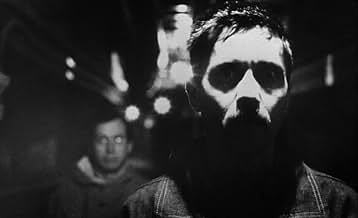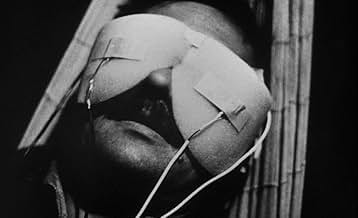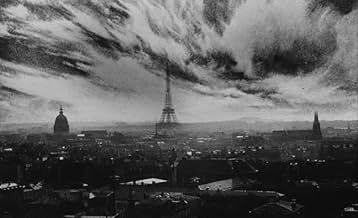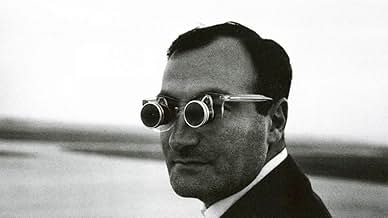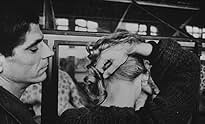La jetée
- 1962
- Tous publics
- 28min
NOTE IMDb
8,2/10
39 k
MA NOTE
L'histoire d'un homme forcé à explorer ses souvenirs au lendemain de la dévastation de la Troisième Guerre mondiale, sous forme d'une suite de photos.L'histoire d'un homme forcé à explorer ses souvenirs au lendemain de la dévastation de la Troisième Guerre mondiale, sous forme d'une suite de photos.L'histoire d'un homme forcé à explorer ses souvenirs au lendemain de la dévastation de la Troisième Guerre mondiale, sous forme d'une suite de photos.
- Réalisation
- Scénario
- Casting principal
- Récompenses
- 2 victoires au total
Jean Négroni
- Narrator
- (voix)
- (as Jean Negroni)
Ligia Branice
- A woman from the future
- (as Ligia Borowcyk)
William Klein
- A man from the future
- (as Bill Klein)
James Kirk
- Narrator
- (English version)
- (voix)
Avis à la une
I had never seen such an original film that works so well. The artist with no budget decides to make a film that could have appealed to the commercial masses. That is what is scary about it. It's the kind of story that we would consider "blockbuster gold". A journey through time, sci-fi, and romance. And yet, it requires no special effects, it requires no big budget. Marker laughs right at the face of conventional cinema and uses stills to let out imagination read between the lines.
Is this fiction? Yes, to some extent. The post-apocalyptic story that it recounts would make Waterworld blush with embarrassment, true. But once again, the arty film looks at us to find a meaning for the story. At the end of the day, are we more taken aback by the technical aspect in which Marker engages, or by the shocking finale. Would the finale have been so shocking had Marker used a Bolex camera? I fear not. The bit where he's running towards the girl in the end feels like an average nightmare, where you're running, but you can't get to wherever you want to get to. It's a feeling we have all felt, and the lack of movement within the frame conveys a certain feeling of helplessness and entrapment that could only have been achieved this well with stills.
And we must say, these stills are amazing. It's not only the elaborate mise-en-scene, or the design of the sets and the props (the french sci-fi glasses are extraordinary). It's also the placement of the camera, that has a ghostly versatility that often adds to the lack of comfort of the restless characters.
I must also give a shout for the score that is amazing, which is strange if we count that your average experimental film hardly ever employs such "cinematic" scores, always going for the more minimalist (and generally less expansive) ones.
Is this fiction? Yes, to some extent. The post-apocalyptic story that it recounts would make Waterworld blush with embarrassment, true. But once again, the arty film looks at us to find a meaning for the story. At the end of the day, are we more taken aback by the technical aspect in which Marker engages, or by the shocking finale. Would the finale have been so shocking had Marker used a Bolex camera? I fear not. The bit where he's running towards the girl in the end feels like an average nightmare, where you're running, but you can't get to wherever you want to get to. It's a feeling we have all felt, and the lack of movement within the frame conveys a certain feeling of helplessness and entrapment that could only have been achieved this well with stills.
And we must say, these stills are amazing. It's not only the elaborate mise-en-scene, or the design of the sets and the props (the french sci-fi glasses are extraordinary). It's also the placement of the camera, that has a ghostly versatility that often adds to the lack of comfort of the restless characters.
I must also give a shout for the score that is amazing, which is strange if we count that your average experimental film hardly ever employs such "cinematic" scores, always going for the more minimalist (and generally less expansive) ones.
'La Jetee' is a film about movement made up entirely of photographic stills. Well, not entirely. For one transcendent moment the photo moves, ironically at the film's stillest moment, as a woman we have starred at sleeping in the sunny dawn wakes up. It is typical of Marker that a film spanning centuries, millenia, war, torture, experimentation, murder, dreams, time travel, destruction, love, joy, should have as its epiphanical moment an elusive, delusive moment of utter calm, that of a sleeping woman opening her eyes. In a film whose body is the stuff dreams are made on, such a moment is truly cataclysmic.
Like all Marker's masterpieces, 'Jetee', ostensibly a work of science-fiction, is profoundly concerned with Time, Memory and History. Such abstracts treated in lesser hands have a tendency to become vague, airy, removed from life; but Marker, the old leftist, always grounds his philosophy, humanisises and politicises it.
'Jetee', though a short, is rich with ambiguity and irony - the freedom of dreams, to reinvent the past, to escape from circumstances, is exploited by a totalitarian oligarchy, and ultimately fatal for the dreamer. Such is our desperate need to dream, to escape, forget/reinvent, that it is easy to forget that the Man's relationship with the Woman is a phantom, an entire history blown out of a brief glimpse, like that Baudelaire poem where he is stunned by a brief glimpse of a woman he never sees again.
It is this act the tyrants need, this gesture of recreation - by embodying what never happened, by making real or factual what is ultimately desire, he has destroyed history; this paves the way for the vision of 3000, where history is destroyed, and along with it humanity; a Houhnyhm-land of disembodied intelligence. This idea of the death of history, of the victory of post-modernity, would be most eloquently in Marker's chef d'oeuvre, 'Sans Soleil', which was shown with this film at the screening I attended.
But Marker's great achievement here is his creation of the future as a regression, as a descent into medievalism, part-Les Miserables, part-Occupation, with all the signs of French progress and pretension destroyed, with all Haussman's modernity and prosperity run to earth by nuclear contamination, the survivors living in sewers with rats, as their ancestors once did.
Marker's vision is terrifying in its mixture of ruined symmetry and a sickening moral blackness, the general silence punctuated by impenetrable whispers and noises - this is one of the most frightening soundtracks I've ever heard. This medievalism also means a bypassing of the intellect, of literal Enlightenment, and back to a kind of spiritual murk, with pastiche sacred music flooding the film, and parodies of religious kitsch obtruding (the godlike light seeping into dense interiors; religious slogans; the compositions of survivors like beatified saints) on the relics of civilisation, the graffiti, the now-impenetrable codes.
This chaos is contrasted with the Paris of the dream, especially in the museum scene, even more chilling with its statues looking like petrified relics from a volcanic disaster; the mute, stuffed animals warning humans of their fate; the exquisite composition of architecture, trapping the couple in a web of order, boxes, classification, obsolescence, the doomed attempts by mankind to order the universe.
yet this dream is so moving because it offers love, connection, gardens, talk, dreams, Paris, even if they are illusory. because, although this is a dense, difficult, allusive, modern film, it also illuminates a simple, ancient truth 'In the midst of life, we are in death'. As Morrissey once responded, 'Etcetera'.
Like all Marker's masterpieces, 'Jetee', ostensibly a work of science-fiction, is profoundly concerned with Time, Memory and History. Such abstracts treated in lesser hands have a tendency to become vague, airy, removed from life; but Marker, the old leftist, always grounds his philosophy, humanisises and politicises it.
'Jetee', though a short, is rich with ambiguity and irony - the freedom of dreams, to reinvent the past, to escape from circumstances, is exploited by a totalitarian oligarchy, and ultimately fatal for the dreamer. Such is our desperate need to dream, to escape, forget/reinvent, that it is easy to forget that the Man's relationship with the Woman is a phantom, an entire history blown out of a brief glimpse, like that Baudelaire poem where he is stunned by a brief glimpse of a woman he never sees again.
It is this act the tyrants need, this gesture of recreation - by embodying what never happened, by making real or factual what is ultimately desire, he has destroyed history; this paves the way for the vision of 3000, where history is destroyed, and along with it humanity; a Houhnyhm-land of disembodied intelligence. This idea of the death of history, of the victory of post-modernity, would be most eloquently in Marker's chef d'oeuvre, 'Sans Soleil', which was shown with this film at the screening I attended.
But Marker's great achievement here is his creation of the future as a regression, as a descent into medievalism, part-Les Miserables, part-Occupation, with all the signs of French progress and pretension destroyed, with all Haussman's modernity and prosperity run to earth by nuclear contamination, the survivors living in sewers with rats, as their ancestors once did.
Marker's vision is terrifying in its mixture of ruined symmetry and a sickening moral blackness, the general silence punctuated by impenetrable whispers and noises - this is one of the most frightening soundtracks I've ever heard. This medievalism also means a bypassing of the intellect, of literal Enlightenment, and back to a kind of spiritual murk, with pastiche sacred music flooding the film, and parodies of religious kitsch obtruding (the godlike light seeping into dense interiors; religious slogans; the compositions of survivors like beatified saints) on the relics of civilisation, the graffiti, the now-impenetrable codes.
This chaos is contrasted with the Paris of the dream, especially in the museum scene, even more chilling with its statues looking like petrified relics from a volcanic disaster; the mute, stuffed animals warning humans of their fate; the exquisite composition of architecture, trapping the couple in a web of order, boxes, classification, obsolescence, the doomed attempts by mankind to order the universe.
yet this dream is so moving because it offers love, connection, gardens, talk, dreams, Paris, even if they are illusory. because, although this is a dense, difficult, allusive, modern film, it also illuminates a simple, ancient truth 'In the midst of life, we are in death'. As Morrissey once responded, 'Etcetera'.
In 1995, Terry Gilliam made one of the finest movies in the nineties: "Twelve Monkeys". To explain how he made this awesome movie, he openly declared that he drew his inspiration from a French short film: "La Jetée". It is true that the 2 opus have similarities: both present a devastated earth caused by man's madness, survivors who take refuge in underground rooms and try to improve their grueling living conditions and especially both feature a jaded and manipulated main character.
A short film that is a reflection about time, happiness and love, entirely composed of static shots, "la jetée" is a powerful and mesmerizing work and it may appear as a cornerstone in French cinema. 42 years after its release, it kept all its strength and has not aged a bit. The quality of the editing, the photography and the commentary add to the success of Chris Marker's work.
Highly recommended and the influence of Chris Marker's short film on "Twelve Monkeys" shows well a thing: French cinema inspired a great number of American movies.
A short film that is a reflection about time, happiness and love, entirely composed of static shots, "la jetée" is a powerful and mesmerizing work and it may appear as a cornerstone in French cinema. 42 years after its release, it kept all its strength and has not aged a bit. The quality of the editing, the photography and the commentary add to the success of Chris Marker's work.
Highly recommended and the influence of Chris Marker's short film on "Twelve Monkeys" shows well a thing: French cinema inspired a great number of American movies.
"La jetée" is a million years ahead of its time. To make a movie in 1962 about World War III, time traveling and a distant future that is still genuinely disturbing and not in the least outdated comes close to a miracle.
Here's a short synopsis of the story: After World War III Paris is lying in tatters. The earth has been contaminated and survivors of the war have to live underground imprisoned by the victorious nation (it's never said explicitly which nation that is, but they are talking German). Scientists are looking for a way to secure the survival of mankind by exploring the possibilities of time traveling. In the process one of the prisoners, who has a strong connection to the past because of a recurring dream of his childhood, serves as their guinea pig. As the experiments go on the time traveler falls in love with a woman from the past and comes face to face with the childhood memory he's been obsessed with all his life.
The story might have a familiar ring to you. It's basically the same story Terry Gilliam used in "12 Monkeys". But while "12 Monkeys" is a great movie, ultimately it will be "La jetée" that will stand the test of time (no pun intended). Director/screenwriter Chris Marker's approach is amazingly clever and effective. His movie is a sequence of beautiful black and white photographs with somebody narrating the story. The pictures and the perfect music make the whole thing seem like a documentary on World War II and give the movie a disturbingly realistic feel. Marker never makes the mistake to show too much. The destruction of Paris, the experiments and the future are all hinted at rather vaguely in the pictures and in the narration. A lot is left to our imagination and when The Man, as the main character is simply called, drifts through time it almost seems like a feverish dream to the viewer, too. What's more concrete is the relationship of The Man and The Woman and the contrast between the short untroubled moments The Man spends in the past and his enslavement in the present. Marker concentrates on those aspects and almost shrugs the time traveling off as a negligibility and the result is nothing short of amazing.
With its 26 minutes running time "La jetée" accomplishes more than some epic trilogies do. It remains a classy work of art that looks fresher than any other movie from the 60's that I've ever seen and in 50 years from now it will not have lost any of its appeal, either.
Here's a short synopsis of the story: After World War III Paris is lying in tatters. The earth has been contaminated and survivors of the war have to live underground imprisoned by the victorious nation (it's never said explicitly which nation that is, but they are talking German). Scientists are looking for a way to secure the survival of mankind by exploring the possibilities of time traveling. In the process one of the prisoners, who has a strong connection to the past because of a recurring dream of his childhood, serves as their guinea pig. As the experiments go on the time traveler falls in love with a woman from the past and comes face to face with the childhood memory he's been obsessed with all his life.
The story might have a familiar ring to you. It's basically the same story Terry Gilliam used in "12 Monkeys". But while "12 Monkeys" is a great movie, ultimately it will be "La jetée" that will stand the test of time (no pun intended). Director/screenwriter Chris Marker's approach is amazingly clever and effective. His movie is a sequence of beautiful black and white photographs with somebody narrating the story. The pictures and the perfect music make the whole thing seem like a documentary on World War II and give the movie a disturbingly realistic feel. Marker never makes the mistake to show too much. The destruction of Paris, the experiments and the future are all hinted at rather vaguely in the pictures and in the narration. A lot is left to our imagination and when The Man, as the main character is simply called, drifts through time it almost seems like a feverish dream to the viewer, too. What's more concrete is the relationship of The Man and The Woman and the contrast between the short untroubled moments The Man spends in the past and his enslavement in the present. Marker concentrates on those aspects and almost shrugs the time traveling off as a negligibility and the result is nothing short of amazing.
With its 26 minutes running time "La jetée" accomplishes more than some epic trilogies do. It remains a classy work of art that looks fresher than any other movie from the 60's that I've ever seen and in 50 years from now it will not have lost any of its appeal, either.
La Jettée (1962) is not only the most important work of science-fiction cinema since Fritz Lang's masterwork Metropolis (1927), but is also one of the most staggering achievements in the entire history of film. Here, filmmaker Chris Marker presents the audience with the ultimate cinematic dystopia; a futuristic, industrialised landscape of underground tunnels, colourless streets and jarring 60's architecture. The results are beautiful yet somewhat anachronistic, as the filmmaker employs a similar approach to that of Godard in Alphaville (1965) - or more recently, Winterbottom's Code 46 (2003) - albeit, with a less straightforward attitude to plot and ideology.
The basic narrative outline of the film is built around various reflective layers - similar to what Tarkovsky would use in his later film, Mirror (1975) - which allow Marker to create a certain feeling of mirroring between the notions of fact and fiction, life and death, reality and fantasy and so on. This, in turn, further develops the characters and the world of which they inhabit. The reason the film works without becoming a cold, lifeless lecture is because it anchors the images of nuclear holocaust and scientific exploration within humanistic characters and a sense of unashamed romanticism. But this is only one part of an elaborate puzzle; lest we forget that we are dealing with certain narrative paradoxes, not to mention an assortment of linear and non-linear story elements each unfolding simultaneously. Just when we think we've got the whole film worked out, our perspectives immediately change, and our ideas are lost in the blink of an eye.
However, aside from thematic visual palindromes, what is most remarkable about La Jettée - and the reason it has retained its reputation as a work of genius - is the way in which Marker manages to relate his story of travel and movement through the use of still images. By presenting these pictures to us in a sort of photo-montage - complete with brooding voice-over and various sound effects - the director somehow manages to bring the stillness of his film miraculously to life. It is, without question, a work of pure, unadulterated imagination, and a staggering testament to Marker's genius ability to convey a multitude of feelings, ideas and emotions, through a series of simple, static, though nonetheless, deeply evocative images.
The basic narrative outline of the film is built around various reflective layers - similar to what Tarkovsky would use in his later film, Mirror (1975) - which allow Marker to create a certain feeling of mirroring between the notions of fact and fiction, life and death, reality and fantasy and so on. This, in turn, further develops the characters and the world of which they inhabit. The reason the film works without becoming a cold, lifeless lecture is because it anchors the images of nuclear holocaust and scientific exploration within humanistic characters and a sense of unashamed romanticism. But this is only one part of an elaborate puzzle; lest we forget that we are dealing with certain narrative paradoxes, not to mention an assortment of linear and non-linear story elements each unfolding simultaneously. Just when we think we've got the whole film worked out, our perspectives immediately change, and our ideas are lost in the blink of an eye.
However, aside from thematic visual palindromes, what is most remarkable about La Jettée - and the reason it has retained its reputation as a work of genius - is the way in which Marker manages to relate his story of travel and movement through the use of still images. By presenting these pictures to us in a sort of photo-montage - complete with brooding voice-over and various sound effects - the director somehow manages to bring the stillness of his film miraculously to life. It is, without question, a work of pure, unadulterated imagination, and a staggering testament to Marker's genius ability to convey a multitude of feelings, ideas and emotions, through a series of simple, static, though nonetheless, deeply evocative images.
Le saviez-vous
- AnecdotesThis short film was the inspiration for the Terry Gilliam film L'Armée des 12 singes (1995).
- Crédits fousThe opening credits do not describe it as a film, but as "un photo-roman".
- ConnexionsEdited into The Hamster Factor and Other Tales of Twelve Monkeys (1996)
Meilleurs choix
Connectez-vous pour évaluer et suivre la liste de favoris afin de recevoir des recommandations personnalisées
Détails
- Durée28 minutes
- Couleur
- Mixage
- Rapport de forme
- 1.66 : 1
Contribuer à cette page
Suggérer une modification ou ajouter du contenu manquant


